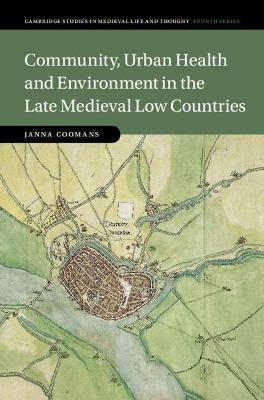
Community, Urban Health and Environment in the Late Medieval Low Countries
Seiten
2021
Cambridge University Press (Verlag)
978-1-108-83177-2 (ISBN)
Cambridge University Press (Verlag)
978-1-108-83177-2 (ISBN)
Debunking the myth of medieval cities as apathetic in the face of filth and disease, Janna Coomans builds a new understanding of how preventative health practices shaped urban communities, with responsibilities negotiated among different groups, across areas ranging from water, food and sanitation to pigs, prostitutes and plague.
By exploring the uniquely dense urban network of the Low Countries, Janna Coomans debunks the myth of medieval cities as apathetic towards filth and disease. Based on new archival research and adopting a bio-political and spatial-material approach, Coomans traces how cities developed a broad range of practices to protect themselves and fight disease. Urban societies negotiated challenges to their collective health in the face of social, political and environmental change, transforming ideas on civic duties and the common good. Tasks were divided among different groups, including town governments, neighbours and guilds, and affected a wide range of areas, from water, fire and food, to pigs, prostitutes and plague. By studying these efforts in the round, Coomans offers new comparative insights and bolsters our understanding of the importance of population health and the physical world - infrastructures, flora and fauna - in governing medieval cities.
By exploring the uniquely dense urban network of the Low Countries, Janna Coomans debunks the myth of medieval cities as apathetic towards filth and disease. Based on new archival research and adopting a bio-political and spatial-material approach, Coomans traces how cities developed a broad range of practices to protect themselves and fight disease. Urban societies negotiated challenges to their collective health in the face of social, political and environmental change, transforming ideas on civic duties and the common good. Tasks were divided among different groups, including town governments, neighbours and guilds, and affected a wide range of areas, from water, fire and food, to pigs, prostitutes and plague. By studying these efforts in the round, Coomans offers new comparative insights and bolsters our understanding of the importance of population health and the physical world - infrastructures, flora and fauna - in governing medieval cities.
Janna Coomans is a postdoctoral researcher in the ERC project 'Healthscaping Urban Europe'. She obtained her PhD on public health in the medieval Low Countries cum laude, which received the Praemium Erasmianum and Pro Civitate prizes. Her main research interests are the history of cities, health and environments, as well as gender, crime and daily politics.
Introduction; 1. Galenic Health and the Biopolitics of Flow; 2. The Purged Urban Heart: Municipal Sanitation; 3. Food, Health and the Marketplace; 4. Good Neighbours: Nuisance and Harmony in Living Environments; 5. Plague in Urban Healthscapes; 6. Building Community, Balancing Public Health and Order; Conclusion: Urban Health Expeditions.
| Erscheinungsdatum | 16.08.2021 |
|---|---|
| Reihe/Serie | Cambridge Studies in Medieval Life and Thought: Fourth Series |
| Zusatzinfo | Worked examples or Exercises |
| Verlagsort | Cambridge |
| Sprache | englisch |
| Maße | 155 x 235 mm |
| Gewicht | 660 g |
| Themenwelt | Geschichte ► Allgemeine Geschichte ► Mittelalter |
| Geisteswissenschaften ► Geschichte ► Regional- / Ländergeschichte | |
| ISBN-10 | 1-108-83177-X / 110883177X |
| ISBN-13 | 978-1-108-83177-2 / 9781108831772 |
| Zustand | Neuware |
| Haben Sie eine Frage zum Produkt? |
Mehr entdecken
aus dem Bereich
aus dem Bereich
eine neue Geschichte des Mittelalters
Buch | Hardcover (2023)
C.H.Beck (Verlag)
CHF 53,20


